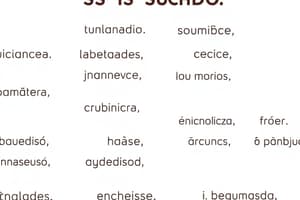Podcast
Questions and Answers
What is the correct translation for 'Good evening'?
What is the correct translation for 'Good evening'?
- Buenas noches (correct)
- Buenas tardes
- ¡Hola!
- Buenos días
If someone asks '¿Cómo estás?' what type of response is expected?
If someone asks '¿Cómo estás?' what type of response is expected?
- A response regarding your well-being (correct)
- A response about how many items you have
- A response about the time
- A response explaining the weather
Which phrase translates to 'See you later'?
Which phrase translates to 'See you later'?
- Hasta luego (correct)
- ¡Adiós!
- Hasta mañana
- ¡Nos vemos!
What does 'Hace frío' mean?
What does 'Hace frío' mean?
Which of the following describes someone who is 'desordenado'?
Which of the following describes someone who is 'desordenado'?
How would you say 'What time is it?' in Spanish?
How would you say 'What time is it?' in Spanish?
What is the translation for 'It's the first of...'?
What is the translation for 'It's the first of...'?
Which of the following translates to 'How do you say...?'
Which of the following translates to 'How do you say...?'
Flashcards
Buenos días
Buenos días
A polite way to say 'hello' to someone in Spanish.
Buenas noches
Buenas noches
A polite way to say 'good evening' in Spanish.
Buenas tardes
Buenas tardes
A polite way to say 'good afternoon' in Spanish.
“¿Cómo está Ud.?”
“¿Cómo está Ud.?”
Signup and view all the flashcards
“¿Cómo estás?”
“¿Cómo estás?”
Signup and view all the flashcards
“¡Adiós!”
“¡Adiós!”
Signup and view all the flashcards
“Hasta luego”
“Hasta luego”
Signup and view all the flashcards
“Hasta mañana”
“Hasta mañana”
Signup and view all the flashcards
Study Notes
Greetings
- Formal: Buenos días (Good morning), Buenas tardes (Good afternoon), Buenas noches (Good evening).
- Informal: ¡Hola! (Hello)
- Name: ¿Cómo te llamas? (What is your name?), Me llamo... (My name is...).
- Politeness: Encantado/a (Delighted), Igualmente (Likewise), Mucho gusto (Pleased to meet you), Sr./Sra./Srta. (Sir/Madam/Miss).
How are you?
- Formal: ¿Cómo está Ud.? (How are you?)
- Informal: ¿Cómo estás? (How are you?), ¿Qué pasa? (What's happening?), ¿Qué tal? (How are you?)
- Responding: (Muy) bien (very well), nada (nothing), regular (okay/so-so), gracias (thank you).
- Follow-up: ¿Y tú?/¿Y usted? (And you?)
Saying Goodbye
- Common: ¡Adiós! (Goodbye!), Hasta luego (See you later), Hasta mañana (See you tomorrow), ¡Nos vemos! (See you!).
Telling Time
- Query: ¿Qué hora es? (What time is it?)
- Responses: Es la una (It's one o'clock), Son las...y/menos... (It's... (time)).
- Specific times: Y cuarto/menos cuarto (quarter past/quarter to), y media (half past).
Weather
- Query: ¿Qué tiempo hace? (What's the weather like?)
- Conditions: Hace calor (It's hot), Hace frío (It's cold), Hace sol (It's sunny), Hace viento (It's windy), Llueve (It's raining), Nieva (It's snowing).
Seasons
- Terms: La estación (season), El invierno (winter), El otoño (fall/autumn), La primavera (spring), El verano (summer).
Describing People
- Positive: Artístico/a (artistic), Atrevido/a (daring), Bueno/a (good), Deportista (sports-minded), Gracioso/a (funny), Inteligente (intelligent), Simpático/a (nice, friendly), Sociable (sociable), Talentoso/a (talented), Trabajador/a (hardworking).
- Neutral/Negative: Desordenado/a (messy), Estudioso/a (studious), Impaciente (impatient), Ordenado/a (neat), Paciente (patient), Perezoso/a (lazy), Reservado/a (reserved/shy), Serio/a (serious).
Classroom
- Objects: Bolígrafo (pen), Carpeta (folder), Cuaderno (notebook), Hoja de papel (sheet of paper), Lápiz (pencil), Libro (book), Pupitre (desk).
- People: Estudiante (student), Profesor/a (teacher).
- Place: Sala de clases (classroom).
Dates
- Query: ¿Qué día es hoy? (What day is it today?), ¿Cuál es la fecha? (What is the date?)
- Response: Es el... de... (It's the... of...).
- Examples: Hoy (today), Mañana (tomorrow), Es el primero de... (It's the first of...).
- Parts of a date: Año (year), Día (day), Mes (month), Semana (week).
Quantity
- Query: ¿Cuántos/as? (How many?)
Other Useful Words
- Prepositions: En (in)
- Existential: Hay (there is/are)
- Politeness: Por favor (please)
- Asking for help: ¿Cómo se dice...? (How do you say...?), ¿Cómo se escribe...? (How is it spelled?), ¿Qué quiere decir...? (What does... mean?).
- Responding to help: Se dice... (You say...), Se escribe... (It’s spelled...), Quiere decir... (It means...).
Studying That Suits You
Use AI to generate personalized quizzes and flashcards to suit your learning preferences.




